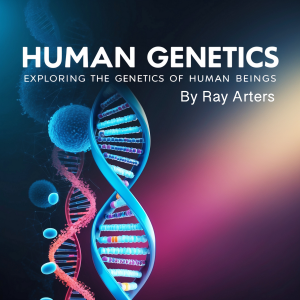

Human Genetics
Ray Arters
This audiobook is narrated by a digital voice.
The human genome represents one of biology's greatest achievements, containing within its approximately 3.2 billion base pairs the complete set of instructions for creating and maintaining a human being. This remarkable molecular library stores information with a precision that surpasses any human-engineered system, encoding not only the proteins that carry out cellular functions but also the regulatory sequences that control when, where, and how much of each protein is produced throughout development and adult life.
The structure of human chromosomes reflects millions of years of evolutionary refinement, with genetic material organized into 23 pairs of chromosomes that ensure proper segregation during cell division while maintaining the integrity of hereditary information across generations. Each chromosome contains a single, continuous DNA molecule ranging from about 48 million base pairs in chromosome 21 to over 247 million base pairs in chromosome 1, packaged with histone proteins into a compact yet accessible form that can fit within the microscopic confines of a cell nucleus.
The discovery that humans possess only about 20,000 to 25,000 protein-coding genes, roughly the same number as the simple nematode C. elegans, initially surprised scientists who had expected human complexity to correlate with gene number. This revelation highlighted the importance of regulatory complexity rather than gene number in determining organismal sophistication. The vast majority of the human genome consists of non-coding sequences that were once dismissed as "junk DNA" but are now recognized as containing crucial regulatory elements, including enhancers, silencers, and non-coding RNAs that fine-tune gene expression.
Duration - 48m.
Author - Ray Arters.
Narrator - Digital Voice Mia G.
Published Date - Thursday, 30 January 2025.
Copyright - © 2025 Ray Arters ©.
Location:
United States
Description:
This audiobook is narrated by a digital voice. The human genome represents one of biology's greatest achievements, containing within its approximately 3.2 billion base pairs the complete set of instructions for creating and maintaining a human being. This remarkable molecular library stores information with a precision that surpasses any human-engineered system, encoding not only the proteins that carry out cellular functions but also the regulatory sequences that control when, where, and how much of each protein is produced throughout development and adult life. The structure of human chromosomes reflects millions of years of evolutionary refinement, with genetic material organized into 23 pairs of chromosomes that ensure proper segregation during cell division while maintaining the integrity of hereditary information across generations. Each chromosome contains a single, continuous DNA molecule ranging from about 48 million base pairs in chromosome 21 to over 247 million base pairs in chromosome 1, packaged with histone proteins into a compact yet accessible form that can fit within the microscopic confines of a cell nucleus. The discovery that humans possess only about 20,000 to 25,000 protein-coding genes, roughly the same number as the simple nematode C. elegans, initially surprised scientists who had expected human complexity to correlate with gene number. This revelation highlighted the importance of regulatory complexity rather than gene number in determining organismal sophistication. The vast majority of the human genome consists of non-coding sequences that were once dismissed as "junk DNA" but are now recognized as containing crucial regulatory elements, including enhancers, silencers, and non-coding RNAs that fine-tune gene expression. Duration - 48m. Author - Ray Arters. Narrator - Digital Voice Mia G. Published Date - Thursday, 30 January 2025. Copyright - © 2025 Ray Arters ©.
Language:
English
Human Genetics
Duration:00:48:24